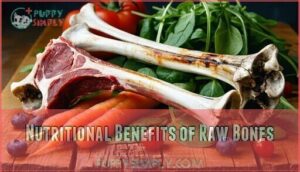This site is supported by our readers. We may earn a commission, at no cost to you, if you purchase through links.

These hard bones splinter easily, creating sharp pieces that can cut your dog’s mouth, throat, or intestines.
They also pose choking risks and can block your pup’s digestive system, leading to emergency surgery.
Cooked pork bones are especially risky because they become brittle and break apart unpredictably.
Even raw pork femur bones aren’t safe due to their size and density.
Your furry friend deserves better than a trip to the emergency vet.
Safer chewing alternatives exist that’ll keep your dog happy without the worry.
Table Of Contents
- Key Takeaways
- Risks of Pork Femur Bones
- Can Dogs Eat Pork Femur Bones
- Safe Alternatives to Pork Bones
- Symptoms of Bone Ingestion
- Choosing Safe Bones for Dogs
- Nutritional Benefits of Raw Bones
- Frequently Asked Questions (FAQs)
- Is pork femur bone good for dogs?
- Do pork femur bones splinter?
- Are femur bones safe for dogs to chew on?
- Can my dog eat raw femur bone?
- How often should dogs be given pork femur bones?
- How often can dogs have pork bones?
- What age can puppies start eating bones?
- Are pork femur bones safe for senior dogs?
- How long should dogs chew on bones?
- Conclusion
Key Takeaways
- Don’t give your dog pork femur bones – they splinter into sharp fragments that can cause choking, internal bleeding, and life-threatening intestinal blockages requiring emergency surgery.
- Watch for warning signs if your dog accidentally eats bone fragments – vomiting, drooling, abnormal bowel movements, and loss of appetite signal serious problems needing immediate vet attention.
- Choose safer alternatives like raw cow or bison bones that are appropriately sized for your dog, or stick with veterinarian-approved dental chews that won’t splinter.
- Always supervise chewing sessions and limit them to 10-15 minutes – remove any bone that becomes small enough for your dog to swallow whole to prevent choking hazards.
Risks of Pork Femur Bones
When you’re considering giving your dog a pork femur bone, you need to understand the serious health risks these bones create.
Pork femur bones can splinter into sharp pieces that cause choking, intestinal blockages, and internal damage to your dog’s digestive system.
**Pork femur bones transform into dangerous weapons that can seriously harm your dog’s health.
Choking Hazards
When considering pork femur bones dogs might encounter, choking hazard risks become your primary concern.
These bones break into unpredictable fragments that can block your dog’s airway completely.
Here’s what makes bone splintering so dangerous:
- Fragment Size – Sharp pieces range from pebble-sized chunks to needle-thin splinters
- Bone Size – Even large femur bones create small, dangerous fragments when chewed
- Swallowing Risk – Dogs often gulp fragments before you notice the dog bone dangers
- Airway Obstruction – Pieces lodge in throats, requiring immediate Emergency Response
Intestinal Blockages
When pork femur bones dogs consume break apart, the fragments can create serious intestinal blockages.
Dog bone blockage symptoms include vomiting, bloating, and straining to defecate.
Diagnosis methods involve X-rays and physical exams.
Surgical intervention often becomes necessary to remove obstructions.
Post-op care requires careful monitoring and restricted activity.
Prevention strategies include avoiding all pork bones entirely for your pet’s safety.
Internal Damage
Beyond blockages, pork femur bones create sharp fragments that can puncture your dog’s digestive tract walls.
Sharp bone fragments act like tiny knives, slicing through your dog’s delicate digestive system without warning.
These microscopic shards cause serious internal bleeding and digestive complications you won’t immediately notice.
- Bone fragments slice through the esophagus during swallowing
- Intestinal perforations develop from jagged pieces
- Internal bleeding occurs without visible symptoms
- Esophagus damage creates long-term swallowing problems
Can Dogs Eat Pork Femur Bones
The short answer is no – you shouldn’t give your dog pork femur bones. These bones pose serious risks regardless of their preparation method.
Cooking effects make pork bones brittle and prone to splintering, while raw versions can still break into dangerous fragments during chewing.
Bone size matters substantially for dog bone safety. Even large pork femur bones can crack unpredictably, creating sharp pieces that threaten your pet’s health.
Bone source also plays a role – pork bones are particularly problematic compared to other options. Breed susceptibility varies, but all dogs face similar pork bone risks.
Small breeds may struggle with bone digestion more than larger dogs, but even big dogs can suffer internal injuries from bone fragments. Due to the potential for bacterial growth, raw pork bones present additional hazards.
Regarding bones for dogs and dog chewing bones, pork simply isn’t worth the gamble with your pet’s wellbeing.
Safe Alternatives to Pork Bones
You don’t have to give up on satisfying your dog’s chewing needs just because pork femur bones aren’t safe.
Several alternatives can provide the same enjoyment and dental benefits without the dangerous risks of splintering or choking, offering a safe solution.
Raw Cow or Bison Bones
Unlike pork bones, raw cow and bison bones offer your dog safer chewing options.
These sturdy alternatives provide excellent dental benefits while minimizing splintering risks.
Here’s what makes raw bones for dogs ideal:
- Bone size prevents complete swallowing
- Supervision importance guarantees safe chewing sessions
- Bone source from reputable suppliers matters
- Chew duration should stay under fifteen minutes
Dog chewing bones from cow or bison remain softer than cooked alternatives.
Smoked Pork Femur Bones
While smoked pork femur bones from Carolina Prime might seem appealing with their jerky filling, they still pose significant dog health risks.
The smoking process doesn’t eliminate choking hazards or splintering dangers. Even bones marketed for aggressive chewers can fracture teeth and cause blockages.
Despite their extended shelf life, smoked bones carry the same pork femur safety concerns as raw versions. The smoking process can also introduce known carcinogens, increasing the risk of cancer.
Veterinarian-Approved Dental Chews
Professional veterinarians consistently recommend dental chews with VOHC seals for ideal dog dental health.
These specialized chews contain carefully selected ingredients that mechanically remove plaque while providing mental stimulation.
When comparing brands, consider chew lifespan, cost analysis, and your dog’s preferences.
Unlike traditional bones for dogs, veterinarian-approved dental chews offer safer alternatives that support thorough oral care without splintering risks.
These chews often feature a VOHC approved seal, indicating they meet rigorous standards for plaque reduction.
Symptoms of Bone Ingestion
If your dog has eaten a pork bone, you’ll need to watch for specific warning signs that indicate serious problems.
These symptoms can appear quickly and require immediate veterinary attention to prevent life-threatening complications.
Vomiting and Drooling
Two key warning signs signal serious trouble when your dog ingests pork bones.
Excessive drooling causes immediate concern, while projectile vomiting indicates potential dog intestinal blockage.
Watch for bile in vomit, which creates dehydration risks and possible aspiration pneumonia.
These dog symptoms show severe dog discomfort requiring immediate veterinary care.
Don’t wait—dog vomiting after bone consumption demands urgent professional attention.
The presence of bile in vomit is a critical indicator of the severity of the situation.
Abnormal Bowel Movements
Changes in your dog’s stool consistency signal potential trouble after bone ingestion.
You’ll notice harder, whiter stools from bone fragments or loose, bloody movements indicating internal damage.
Straining signs during bowel movements suggest blockage requiring immediate veterinary diagnosis.
Bully sticks offer a safer, digestible alternative.
Watch for these warning signs:
- Blood presence in stools or unusual coloring
- Dog constipation with powdery white appearance
- Increased bowel frequency with obvious discomfort, which may indicate internal damage or require immediate veterinary diagnosis.
Lack of Appetite
When your dog loses interest in their favorite kibble after bone ingestion, it’s a red flag signaling potential digestive tract problems.
Underlying causes include intestinal blockage symptoms that make eating uncomfortable. Veterinary assessment becomes essential as appetite stimulants won’t fix mechanical obstructions.
Monitor hydration importance closely, as dehydrated dogs worsen quickly. Dietary changes mean nothing if blockages prevent normal digestion completely, which is a clear sign of a mechanical obstruction.
Choosing Safe Bones for Dogs
When you’re selecting bones for your dog, you’ll need to evaluate the size, type, and preparation method to guarantee safety.
Choose raw bones that are large enough to prevent swallowing, avoid all cooked bones that can splinter, and always supervise your dog during chewing sessions.
Size and Type Considerations
When selecting bones for your dog, size matters more than you might think.
The bone should exceed your dog’s jaw width by 1.5 times to prevent swallowing.
Dog owners should research appropriate bone sizes for their pets.
Consider these critical factors:
- Bone Dimensions – Match femur bones to your dog’s breed and weight specifications
- Age Factors – Younger dogs need softer bones to prevent dental fractures
- Bone Density – Choose appropriate hardness levels based on your dog’s chewing habits
Supervised Chewing
Never leave your dog alone while they’re working on bones for dogs. Watch for signs of aggressive chewing or splintering during bone supervision sessions.
Limit chewing duration to 10-15 minutes to prevent jaw fatigue. Conduct regular bone inspection for sharp edges or damage.
Consider the importance of proper bone product selection for your dog. Provide fresh water nearby for hydration importance.
Practice safe disposal of worn-down bones immediately to prevent choking hazards.
Avoiding Cooked Bones
Heat transforms safe bones into dangerous weapons. Cooking dangers make bones brittle and prone to splintering risks that can cause serious oral injuries.
Your dog’s safety depends on understanding bone brittleness and blockage potential. Bacterial contamination is possible from cooked bones.
- Cooked bones break into sharp pieces that puncture mouths and throats
- High temperatures remove moisture, creating choking hazards from brittle fragments
- Dog bone splintering increases dramatically after cooking processes
- Bone safety requires avoiding all cooked varieties regardless of size, to prevent serious oral injuries.
Nutritional Benefits of Raw Bones
When you’re looking for safe chewing options, raw bones can provide important nutrients like calcium, phosphorus, and protein that support your dog’s overall health.
These bones also help clean your dog’s teeth naturally while giving them mental stimulation and exercise for their jaw muscles.
Essential Minerals and Macronutrients
Raw pork femur bones pack impressive bone composition, delivering 18-22% calcium and 8-10% phosphorus for your dog’s needs.
These protein sources contain 20-25% collagen-rich content, while fat content stays minimal at under 5%.
Mineral absorption from bone marrow provides zinc, magnesium, and potassium. However, pork nutrition benefits don’t outweigh serious safety risks these bones pose.
Dental Health Benefits
Beyond providing minerals, raw bones act like nature’s toothbrush for your dog.
Chewing stimulates saliva enzymes that naturally break down tartar and prevent gum disease.
This jaw exercise strengthens facial muscles while scraping away plaque buildup.
Safe bones for dogs offer better oral hygiene than many commercial dog dental chews, making bone chewing a practical solution for maintaining your pet’s dental health, and it is a natural way to keep your dog’s teeth clean through raw bones.
Entertainment and Mental Stimulation
Safe bones for dogs provide more than nutrition—they’re natural boredom busters that tackle destructive behavior head-on.
When your pup’s gnawing away, they’re getting mental workouts that puzzle toys can’t match. Dog bone chewing becomes a training aid too, teaching patience and focus.
Here’s what proper dog chewing habits deliver:
- Focused Energy Release – Hours of concentrated chewing that exhausts restless minds
- Problem-Solving Skills – Working around bone angles develops cognitive abilities
- Stress Relief – Repetitive gnawing motions calm anxious dogs naturally
Dog bone entertainment keeps destructive tendencies at bay while supporting healthy development.
Frequently Asked Questions (FAQs)
Is pork femur bone good for dogs?
Walking into dangerous territory, pork femur bones aren’t good for dogs.
They’ll splinter easily, causing choking hazards and internal injuries.
You’re better off choosing safer alternatives like raw cow bones or veterinarian-approved chews instead.
Do pork femur bones splinter?
Yes, pork femur bones definitely splinter when your dog chews them.
Both raw and cooked versions break into sharp, dangerous fragments that can cause choking, internal injuries, or expensive emergency vet visits.
Are femur bones safe for dogs to chew on?
Pork femur bones aren’t safe for your dog to chew.
They splinter easily, causing choking hazards and internal injuries.
Instead, opt for large raw cow bones or veterinarian-approved dental chews that won’t break apart dangerously.
Can my dog eat raw femur bone?
Raw femur bones can be dangerous for your dog.
They’re prone to splintering, which can cause choking, internal injuries, or blockages.
Consider safer alternatives like veterinarian-approved dental chews or appropriately-sized raw cow bones instead.
How often should dogs be given pork femur bones?
Never give your dog pork femur bones.
They’re dangerous whether raw or cooked, causing choking, splintering, and internal injuries.
Instead, choose safer alternatives like veterinarian-approved dental chews or appropriately-sized raw cow bones.
How often can dogs have pork bones?
You shouldn’t give your dog pork bones at all. They’re dangerous whether raw or cooked, causing choking, splintering, and internal injuries. Choose safer alternatives like large raw beef bones instead.
What age can puppies start eating bones?
Puppies can’t safely handle bones until they’re at least 12-16 weeks old with fully developed teeth.
Even then, you’ll want to supervise closely and choose appropriate sizes to prevent choking or digestive issues.
Are pork femur bones safe for senior dogs?
Senior dogs shouldn’t eat pork femur bones due to increased splintering risks that can cause choking, blockages, or internal injuries.
Their aging digestive systems can’t handle bone fragments safely, making veterinarian-approved alternatives much better choices.
How long should dogs chew on bones?
Limit your dog’s chewing sessions to 10-15 minutes at a time.
Watch closely, rotate different bones regularly, and remove them when they become small enough to swallow whole to prevent choking hazards.
Conclusion
Protecting your furry family member means making smart choices about their treats.
Can dogs eat pork femur bones? The answer is a clear no due to serious health risks including choking, blockages, and internal injuries.
Instead, choose safer alternatives like raw cow bones or veterinarian-approved chews that satisfy your dog’s natural urge to gnaw.
Always supervise chewing sessions and consult your vet about appropriate bone options, as your dog’s safety should never be compromised for convenience.














